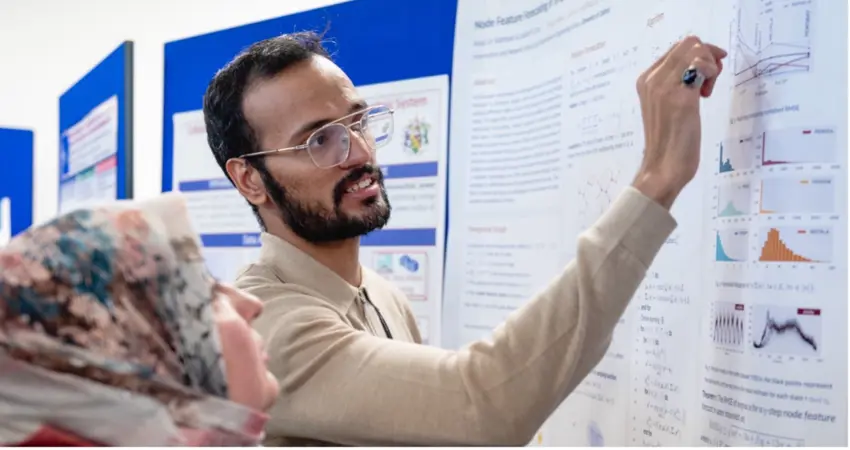13 Dec 2024
DPhil Student Wins Best Poster Award at PhD Connect Conference
DPhil Student Aniq Ur Rahman recently achieved significant recognition at the PhD Connect conference organised by The Alan Turing Institute, where he was awarded the Best Poster Award for an outstanding research presentation.

Aniq’s poster, titled "An Interpretable Online Algorithm for Node Feature Forecasting in Temporal Graphs," introduced the innovative algorithm mspace, which predicts certain features (like user activity or traffic patterns) in networks, such as social networks or transportation systems.
It effectively forecasts these features by capturing both spatial cross-correlations, (how different parts of the network affect each other based on their positions or relationships), and temporal auto-correlations (how they change over time). By understanding both how things are connected and how they evolve, mspace can make better predictions about what will happen in the future.
Aniq's work contributes to the field of temporal graph learning, a type of machine learning which focuses on understanding and predicting changes in networks over time. In temporal graphs, nodes and the relationships between them evolve over time. For example, in a transportation system, traffic patterns or routes may shift. Temporal graph learning uses algorithms to study and make predictions about these time-dependent changes, which is useful in many industries including transportation, the financial sector, healthcare and telecommunications.
The algorithm also focuses on creating models that are easy to understand, so users can see why it makes certain predictions. This is especially useful in situations where there's not a lot of data available, as traditional methods might have a hard time making accurate predictions with limited information.
Aniq says of the award:
“I presented my first DPhil project, and seeing it receive recognition is extremely encouraging. By talking to the participants and judges, I also got many ideas to further extend this work.”
Currently, Aniq's research interests lie at the intersection of network science, machine learning, and causality. He is affiliated with the Information and Network Science Lab and the Communications Engineering research group, under the guidance of Professor Justin Coon. His supervisor shares his congratulations:
“I’m thrilled Aniq has been awarded this prize. He continues to go from strength to strength in his research, and it is great that his work has been recognised at this fantastic conference.”
Aniq continues to contribute to the field of network science, with his research poised to make a meaningful impact on the understanding of temporal graphs and their applications in real-world scenarios.




